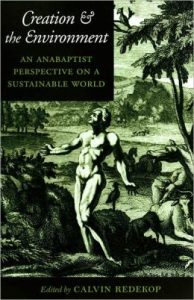 This book was brought to publication with the assistance of the Environmental Task Force of the Mennonite Church, the predecessor of Mennonite Creation Care Network. Edited by Calvin Redekop, Johns Hopkins University Press, 2000.
This book was brought to publication with the assistance of the Environmental Task Force of the Mennonite Church, the predecessor of Mennonite Creation Care Network. Edited by Calvin Redekop, Johns Hopkins University Press, 2000.
If you want to know what the wrath of God looks like, just ask Calvin Redekop. In a startling tale of cosmic justice made personal, Redekop — the editor of Creation & the Environment: An Anabaptist Perspective on a Sustainable World — relates in the book’s introduction his story of the consequences of offense against God’s created order. As he came of age in Montana in the 1930s, Redekop witnessed huge dust storms, ecological devastation, and eventual agricultural collapse brought about by the transformation of the rich prairie ecosystem into monoculture farmland generations before him. It’s a tale reminiscent of the Biblical adage of God visiting the crimes of the fathers upon their descendents; as in the Old Testament stories of sin and judgment, the farmers who transgressed against creation brought down punishment on their children and grandchildren.
Redekop’s introductory story thus frames humanity’s environmental destruction in spiritual terms, and the rest of the book tidily follows suit. Perspectives from Mennonite theologians, activists, economists, and laypersons fill out a vision for an Anabaptist ethic grounded in the very real awareness that ecological sin brings destruction and poverty. The book is surprising in its scope; it begins with a summary of humanity’s effect on the biosphere, and covers both Anabaptist thought and action both past and modern. Although undoubtedly a scholarly work, the essays are engaging and generally easy to read, and the authors include examples, stories, and anecdotes to aid the reader’s understanding.
While Creation & the Environment is certainly not the only book to attempt a fusion of Christianity with modern environmentalism, the authors’ attention to extra-Biblical knowledge places it ahead of purely theological works. The essayists use a mix of scriptural influences and modern-day examples from the fields of sociology, biology, and economics to build a grounded, relevant theology of environmental responsibility. So while Leviticus 25 proclaims “the land is mine, for ye are but strangers and sojourners,” the book’s opening essay (“Economics, Development, and Creation,” by James and Karen Harder) shows the extent to which that verse has been disobeyed. The overall effect is engaging and effective, and the book — and, by association, the Mennonite Church — proves itself as a relevant source in the arena of creation care.
Overall, the book is relevant, well-written, and engaging. The only thing it needs? A second edition. The original was written in 2000, and essays date from years earlier. (One author even feels compelled to explain what “electronic mail” is!). In a field like environmentalism, staying current counts — but in all other arenas, this book is a winner. Pick it up. You won’t be disappointed.
Review by Patrick Maxwell, MCCN staff intern, Friday, July 8, 2011
